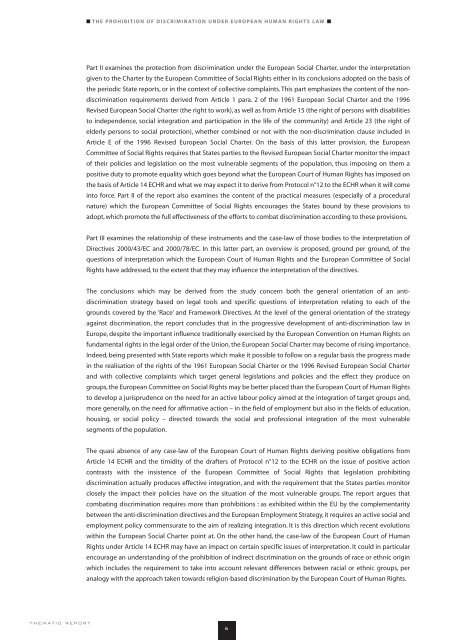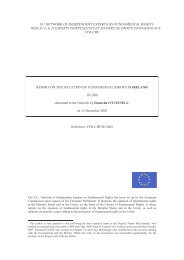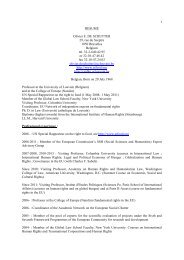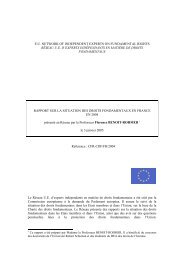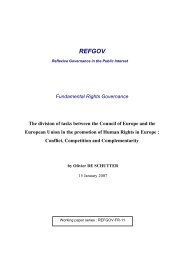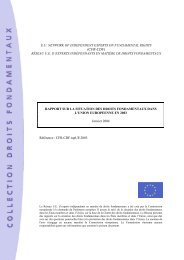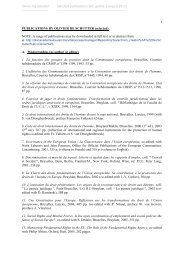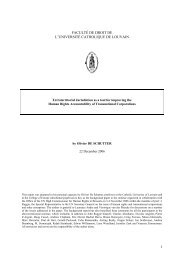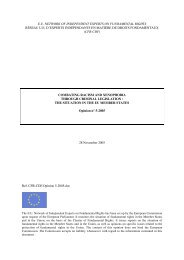The Prohibition of Discrimination under European Human ... - cridho
The Prohibition of Discrimination under European Human ... - cridho
The Prohibition of Discrimination under European Human ... - cridho
You also want an ePaper? Increase the reach of your titles
YUMPU automatically turns print PDFs into web optimized ePapers that Google loves.
thematic report<br />
■ THE PROHIBITION OF DISCRIMINATION UNDER EUROPEAN HUMAN RIGHTS LAW ■<br />
Part II examines the protection from discrimination <strong>under</strong> the <strong>European</strong> Social Charter, <strong>under</strong> the interpretation<br />
given to the Charter by the <strong>European</strong> Committee <strong>of</strong> Social Rights either in its conclusions adopted on the basis <strong>of</strong><br />
the periodic State reports, or in the context <strong>of</strong> collective complaints. This part emphasizes the content <strong>of</strong> the nondiscrimination<br />
requirements derived from Article 1 para. 2 <strong>of</strong> the 1961 <strong>European</strong> Social Charter and the 1996<br />
Revised <strong>European</strong> Social Charter (the right to work), as well as from Article 15 (the right <strong>of</strong> persons with disabilities<br />
to independence, social integration and participation in the life <strong>of</strong> the community) and Article 23 (the right <strong>of</strong><br />
elderly persons to social protection), whether combined or not with the non-discrimination clause included in<br />
Article E <strong>of</strong> the 1996 Revised <strong>European</strong> Social Charter. On the basis <strong>of</strong> this latter provision, the <strong>European</strong><br />
Committee <strong>of</strong> Social Rights requires that States parties to the Revised <strong>European</strong> Social Charter monitor the impact<br />
<strong>of</strong> their policies and legislation on the most vulnerable segments <strong>of</strong> the population, thus imposing on them a<br />
positive duty to promote equality which goes beyond what the <strong>European</strong> Court <strong>of</strong> <strong>Human</strong> Rights has imposed on<br />
the basis <strong>of</strong> Article 14 ECHR and what we may expect it to derive from Protocol n°12 to the ECHR when it will come<br />
into force. Part II <strong>of</strong> the report also examines the content <strong>of</strong> the practical measures (especially <strong>of</strong> a procedural<br />
nature) which the <strong>European</strong> Committee <strong>of</strong> Social Rights encourages the States bound by these provisions to<br />
adopt, which promote the full effectiveness <strong>of</strong> the efforts to combat discrimination according to these provisions.<br />
Part III examines the relationship <strong>of</strong> these instruments and the case-law <strong>of</strong> those bodies to the interpretation <strong>of</strong><br />
Directives 2000/43/EC and 2000/78/EC. In this latter part, an overview is proposed, ground per ground, <strong>of</strong> the<br />
questions <strong>of</strong> interpretation which the <strong>European</strong> Court <strong>of</strong> <strong>Human</strong> Rights and the <strong>European</strong> Committee <strong>of</strong> Social<br />
Rights have addressed, to the extent that they may influence the interpretation <strong>of</strong> the directives.<br />
<strong>The</strong> conclusions which may be derived from the study concern both the general orientation <strong>of</strong> an antidiscrimination<br />
strategy based on legal tools and specific questions <strong>of</strong> interpretation relating to each <strong>of</strong> the<br />
grounds covered by the ‘Race’ and Framework Directives. At the level <strong>of</strong> the general orientation <strong>of</strong> the strategy<br />
against discrimination, the report concludes that in the progressive development <strong>of</strong> anti-discrimination law in<br />
Europe, despite the important influence traditionally exercised by the <strong>European</strong> Convention on <strong>Human</strong> Rights on<br />
fundamental rights in the legal order <strong>of</strong> the Union, the <strong>European</strong> Social Charter may become <strong>of</strong> rising importance.<br />
Indeed, being presented with State reports which make it possible to follow on a regular basis the progress made<br />
in the realisation <strong>of</strong> the rights <strong>of</strong> the 1961 <strong>European</strong> Social Charter or the 1996 Revised <strong>European</strong> Social Charter<br />
and with collective complaints which target general legislations and policies and the effect they produce on<br />
groups, the <strong>European</strong> Committee on Social Rights may be better placed than the <strong>European</strong> Court <strong>of</strong> <strong>Human</strong> Rights<br />
to develop a jurisprudence on the need for an active labour policy aimed at the integration <strong>of</strong> target groups and,<br />
more generally, on the need for affirmative action – in the field <strong>of</strong> employment but also in the fields <strong>of</strong> education,<br />
housing, or social policy – directed towards the social and pr<strong>of</strong>essional integration <strong>of</strong> the most vulnerable<br />
segments <strong>of</strong> the population.<br />
<strong>The</strong> quasi absence <strong>of</strong> any case-law <strong>of</strong> the <strong>European</strong> Court <strong>of</strong> <strong>Human</strong> Rights deriving positive obligations from<br />
Article 14 ECHR and the timidity <strong>of</strong> the drafters <strong>of</strong> Protocol n°12 to the ECHR on the issue <strong>of</strong> positive action<br />
contrasts with the insistence <strong>of</strong> the <strong>European</strong> Committee <strong>of</strong> Social Rights that legislation prohibiting<br />
discrimination actually produces effective integration, and with the requirement that the States parties monitor<br />
closely the impact their policies have on the situation <strong>of</strong> the most vulnerable groups. <strong>The</strong> report argues that<br />
combating discrimination requires more than prohibitions : as exhibited within the EU by the complementarity<br />
between the anti-discrimination directives and the <strong>European</strong> Employment Strategy, it requires an active social and<br />
employment policy commensurate to the aim <strong>of</strong> realizing integration. It is this direction which recent evolutions<br />
within the <strong>European</strong> Social Charter point at. On the other hand, the case-law <strong>of</strong> the <strong>European</strong> Court <strong>of</strong> <strong>Human</strong><br />
Rights <strong>under</strong> Article 14 ECHR may have an impact on certain specific issues <strong>of</strong> interpretation. It could in particular<br />
encourage an <strong>under</strong>standing <strong>of</strong> the prohibition <strong>of</strong> indirect discrimination on the grounds <strong>of</strong> race or ethnic origin<br />
which includes the requirement to take into account relevant differences between racial or ethnic groups, per<br />
analogy with the approach taken towards religion-based discrimination by the <strong>European</strong> Court <strong>of</strong> <strong>Human</strong> Rights.<br />
6


